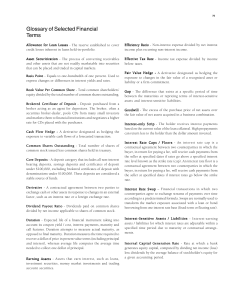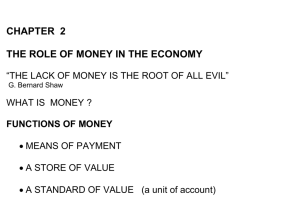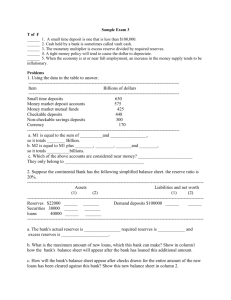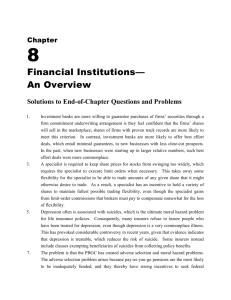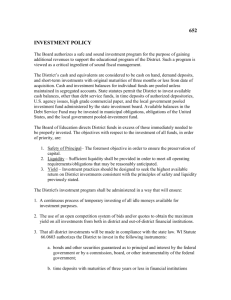Raising funds Public Offer, Right Issue
advertisement
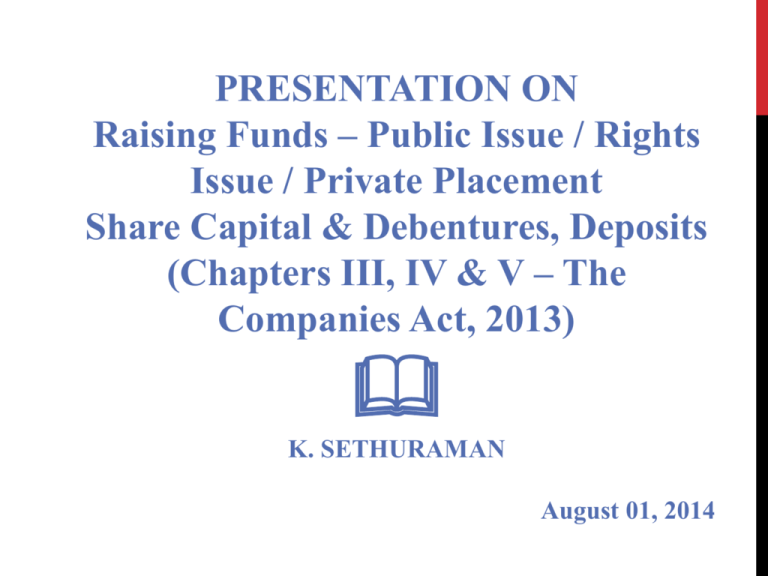
PRESENTATION ON Raising Funds – Public Issue / Rights Issue / Private Placement Share Capital & Debentures, Deposits (Chapters III, IV & V – The Companies Act, 2013) K. SETHURAMAN August 01, 2014 •2 FUND RAISING •3 •4 PUBLIC OFFER & PRIVATE PLACEMENT (S.23) Public company to issue securities: a) To public through prospectus. b) Through private placement. c) Through rights issue or bonus issue. Private company to issue securities a) Through Rights Issue or Bonus Issue b) Through Private Placement Public Issue includes: a) Initial Public Offer / Further Public Offer b) Offer for sale •5 Note: Provisions contained in Chapter III (Public Offer & Private Placement) Chapter IV (Share Capital & Debentures) in so far as they relate to issue and transfer of securities by listed companies and companies which intend to get their securities listed shall be administered by SEBI (Section 24) PROSPECTUS (SEC 26) •6 A company making a public issue also to comply with the disclosure requirements and matters to be stated in the Prospectus as per SEBI (ICDR) Regulations, 2009. Contents of Prospectus are listed out in the Section and in the Companies (Prospectus and Allotment of Securities) Rules, 2014 Following are some of the additional disclosures: (a) The sources of Promoter contribution in the prescribed manner (b) Name and Address of CFO (c) Particulars relating to (a) management perception of risk factor specific to the project, (b) gestation period of the project, (c) extent of progress made in the project and (d) deadline for completion of Project (d) Litigation / Legal action pending or taken by any Govt dept or statutory body against promoters of the company during the last five years •7 VARIATION IN TERMS OF CONTRACT OR OBJECTS IN PROSPECTUS (SECTION 27) A company shall not vary at any time the terms of contract or objects for which the prospectus was at any time issued except with the approval of shareholders by passing a special resolution through Postal Ballot. Justification for such variation should be clearly set out in the notice and published in newspapers in Form PAS - 1. The notice of the Special Resolution to contain, inter-alia: (a) Original purpose or object of issue (b) Total money raised and spent for the object stated in the prospectus (c) Unutilized money so raised through prospectus (d) Particulars of proposed variation and reasons or justification for seeking variation (e) The risk factors pertaining to the new object VARIATION IN TERMS OF CONTRACT OR OBJECTS IN PROSPECTUS (SECTION 27) Such variation may be made not more than one time in any particular public offer. Dissenting shareholders to be given an exit offer by Promoters or Controlling Shareholders at the exit price specified by SEBI. •8 Public issue proceeds cannot be used for buying / dealing in equity shares of any other listed company. OFFER OF SALE (SECTION 28) In consultation with Board of Directors of a company, certain members may offer whole or part of their holdings to the public. Document offering such sale to comply with prospectus requirements and the offer document deemed to be a prospectus. The members offering the shares will reimburse the company all expenses incurred on this matter. •9 In an Offer for Sale, the dividend on the shares offered for the entire year shall be payable to the transferees DEMATERIALIZED FORM (SECTION 29) Every company making public offer; and Prescribed class of public companies, shall issue securities only in dematerialised form. •10 Any other company may convert its securities into dematerialised form or issue its securities in physical form CRIMINAL LIABILITY FOR MIS-STATEMENTS IN PROSPECTUS (SEC 34) If a prospectus issued includes any statement which is untrue or misleading in form or context in which it is included or where any inclusion or omission of any matter is likely to mislead, every person who authorises the issue of such prospectus shall be liable under section 447. •11 The offence would be non-compoundable. CIVIL LIABILITY FOR MIS-STATEMENT IN PROSPECTUS (SEC 35) Company and the following persons liable to pay compensation for any statement included in the prospectus which is misleading, to every person who has subscribed for securities and has sustained any loss or damage as a consequence. •12 a) Director at the time of issue of prospectus. b) Promoter of the company. c) Person who has authorised himself to be named as a director. d) Person who has authorised the issue of prospectus. e) An expert. Above persons personally liable without any limitation of liability for all losses incurred by the subscribers if it is proved that prospectus was issued with intent to defraud the applicants. PUNISHMENT FOR FRAUDULENTLY INDUCING PERSONS TO INVEST MONEY (SEC 36) Any person who, either knowingly or recklessly makes any statement, promise or forecast which is false, deceptive or misleading, or deliberately conceals any material facts, to induce another person to enter into, or to offer to enter into(a) any agreement for, or with a view to, acquiring, disposing of, subscribing for, or underwriting securities; or (b) any agreement, the purpose or the pretended purpose of which is to secure a profit to any of the parties from the yield of securities or by reference to fluctuations in the value of securities; or (c) any agreement for, or with a view to obtaining credit facilities from any bank of financial institution; •13 Shall be liable for action under Section 447. ACTION BY AFFECTED PERSONS (SEC 37) New Provision in the Act •14 A class action suit may be filed by any person, group of persons or any association of persons affected by any misleading statement or the inclusion or omission of any matter in the Prospectus PUNISHMENT FOR PERSONATION FOR ACQUISITION OF SECURITIES (SEC 38) Any person who: a) Makes or abets making of an application in a fictitious name to a company for acquiring its securities b) Makes or abets making multiple applications for acquiring its securities c) Otherwise induces a company to allot or register any transfer of securities in a fictitious name Shall be liable for action under section 447. The Court may order a convicted person for disgorgement of gain and seizure and disposal of securities in possession of such person. •15 Amount received as above to be credited to IEPF. SECURITIES TO BE DEALT WITH IN STOCK EXCHANGES (SEC 40) Company making a public offer, before making the offer shall make an application to a recognised stock exchange and obtain permission for listing the securities Name of the stock exchanges to be stated in the Prospectus All application monies received from Public to be kept in a separate Bank Account in a scheduled bank except for adjustment against allotment of securities or refund of monies within the time specified by SEBI where the company is unable to allot securities Waiver of compliance with any of the above requirements shall be void •16 Company may pay commission in connection with the subscription of its securities PRIVATE PLACEMENT (SEC 42) New Act has tightened provisions relating to private placement to protect stakeholders. Private Placement is an Offer of Securities or invitation to subscribe securities to a select group of persons not exceeding 50 or such higher number (presently 200) as may be prescribed (excluding QIBs and ESOP) in a financial year for each kind of security, that is equity, preference shares or debentures A company may make private placement through issue of a private offer letter in Form PAS-4. •17 Thus, any issue other than a public issue or a Rights issue is a private placement. KEY PROVISIONS GOVERNING PRIVATE PLACEMENT •18 Provisions common to all class of companies – private, public (listed and unlisted) Listed companies are governed by SEBI ICDR Regulations, 2009 Offer through a Private Placement, Offer letter to a selected known group of persons with the prior approval of shareholders by way of a special resolution for each offer (equity shares) Company to pass a special resolution only once in a year for all offers made during the year in case of issue of NonConvertible Debentures Offer to be made to persons whose names are recorded by the company prior to making the offer Application serially numbered with Letter of Offer to be addressed specifically to the concerned person and no other person shall be allowed to apply through such form Even an agreement to allot securities to more than the prescribed number of persons (whether money received or not) shall be deemed to be an offer to the Public KEY PROVISIONS GOVERNING PRIVATE PLACEMENT Offer in a financial year not to exceed 200 persons in aggregate for each kind of security. Value of offer to each person not to be less than Rs 20,000 face value (This requirement not applicable to NBFC Companies and Housing Finance Companies) If a company makes an offer to allot securities to more than the prescribed number of persons, the same to be deemed to be an offer to the public No fresh offer of any securities to be made unless allotments of all earlier offers of any other security are completed or withdrawn or abandoned. •19 The monies payable towards subscription should not be and cannot be in cash. KEY PROVISIONS GOVERNING PRIVATE PLACEMENT Subscription money by way of cheque / draft from the bank account of the sole / first holders name Allotment to be completed within 60 days of receipt of application money – refund within 15 days thereafter; Else interest @ 12% from 60th day Application money to be kept in a separate Bank account till allotment and cannot be utilised other than for allotment / refund •20 Complete information about private placement to be filed with RoC within 30 days of the private placement offer; Listed Company – also with SEBI KEY PROVISIONS GOVERNING PRIVATE PLACEMENT The Company to maintain a complete record of private placement in Form PAS-5 No advertisement or media announcement or engage agents to inform the public at large of the private placement is permitted In case of contravention, the company promoters and directors are liable for penalty which may extend to the amount involved or Rs. 2 crore whichever is higher •21 Company to refund all monies to subscribers within 30 days of the order imposing penalty ADDITIONAL REQUIREMENT FOR PREFERENTIAL ISSUE OF EQUITY SHARES / CONVERTIBLE SECURITIES No partly paid securities shall be issued Allotment to be made within 12 months of the date of the special resolution; Else another special resolution shall be passed. *Till a Registered Valuer is appointed as per the New Act, the valuation report shall be made by an Independent Merchant Banker registered with SEBI or an independent Practising CA having a minimum experience of 10 years [Amendment to the Rules] •22 Various disclosures required in the Explanatory Statement including (a) basis of price of price arrived with Report of Registered Valuers (b) object of the issue (c) name of the proposed allottees and percentage of post preferential offer capital that may be held by them (d) change of control if any consequent to the preferential offer RIGHTS ISSUE Companies Act, 2013 has not defined the concept of ‘Rights Issue’; but it is defined under the SEBI ICDR Regulations ‘Rights Issue’ means an offer of equity shares and convertible securities by a listed issuer to the shareholders of the issuer as on the ‘record date’ fixed for the said purpose No complicated procedures unlike in the case of ‘Public Issue’ or ‘Private Placement’ Requirements of Rights Issue •23 Rights issue to be made after securing board of directors approval at the Board meeting RIGHTS ISSUE The issue price need not be valued by registered valuers Offering shares (Equity / Preference Shares) to the holders of equity shares on a uniform basis (in the same proportion in reference to his equity holding on a ‘cutoff’ date) Offer to be kept open for at least 15 days and not exceeding 30 days (issue cannot be open ended) Letter of offer to be despatched through registered post / speed post at least 3 days before the opening of the issue Listed Companies whose shares are listed should adhere to the requirement set out under SEBI (ICDR) Regulations, 2009 •24 Non compliance with the requirements of a ‘Rights Issue’ shall attract punishment under Section 450 as no specific penalty or punishment is provided in the section regulating ‘Rights Issue’. EMPLOYEES’ STOCK OPTION Company having share capital may make an offer of shares to employees under a Scheme of ‘Employees’ Stock Option’ subject to passing of a special resolution Issue price need not be valued by registered value Issue of ESOP shares by unlisted companies will be governed by Rule 12 of the Companies (Share Capital and Debentures) Rules, 2014. •25 Issue of ESOP Shares by a listed company whose shares are listed will be governed by regulations made by SEBI. DEBENTURES A company may issue debentures – convertible or nonconvertible Issue of convertible debentures into shares requires approval of shareholders by passing a special resolution. Debenture Trustee to be appointed before issuing a prospectus or making an offer to company’s members exceeding 500 persons Company issuing debentures to execute debenture trust deed not later than 60 days after the allotment of debentures •26 No secured debentures can be issued with a redemption period beyond ten years from the date of the issue; A company engaged in setting up infrastructure projects can issue debentures which are redeemable not beyond thirty years from the date of the issue. DEBENTURES A company (including manufacturing / infrastructure) issuing NCDs to create DRR equivalent to atleast 25% of the amount raised by the debenture issue before the debenture redemption commences No DRR by All India Financial Institutions and Banking Companies for debentures issued; NBFCs registered under RBI Act to create DRR of 25% for debentures issued through public issue; No DRR in case of privately placed debentures by them. DRR shall not be utilised by the company except for the purpose of redemption of debentures. •27 The company shall on or before 30th April each year invest or deposit a sum which is not less than 15% of the amount of its debentures maturing during the year ending on 31st day of March of the next year (As per Rules) ISSUE OF PREFERENCE SHARES No company limited by shares shall issue any preference shares which are irredeemable A company may issue preference shares to be redeemed within a period of Twenty years from the date of their issue A company may issue preference shares redeemable beyond 20 years for making funds required for infrastructure projects and the redemption shall be at the option of the preference shareholders •28 Companies engaged in infrastructure projects may redeem preference shares from the 21st year @ 10% minimum redemption such that all the preference shares are redeemed not later than 30 years from the date of issue of Preference Shares. ISSUE OF PREFERENCE SHARES Where dividend payable on Preference Shares (cumulative or non-cumulative) is in arrears for a period of two years or more, such class of preference shareholders shall have a right to vote on all resolutions placed before a meeting of the company •29 Premium payable on redemption of preference shares issued w.e.f. 01.04.2014 will be provided only out of profits of the company VARIATION OF SHAREHOLDERS’ RIGHTS (SEC 48) (SECTION NOT NOTIFIED YET) The rights attached to a class of shares may be varied with consent in writing of the holders of not less than three-fourths of the issued shares of that class, or by means of a special resolution passed by the shareholders of that class. •30 If the variation affects the rights of any other class of shareholders, consent of such other class is necessary in a similar way. PROHIBITION ON ISSUE OF SHARES AT A DISCOUNT (SEC 53) No company shall issue shares at a discount (except sweat equity shares) •31 Any shares issued at a discount shall be void •32 ACCEPTANCE OF DEPOSITS OF COMPANIES (SEC 73-76) ACCEPTANCE OF DEPOSITS (SEC 73) • No company to invite, accept or renew deposits from public, except as provided under Chapter V (only eligible Companies can accept deposits from public) • Provisions not applicable to banking company, NBFC – registered with RBI and other company as may be specified by CG in consultation with RBI •33 • Deposits can be accepted by a company from its members subject to passing a resolution in general meeting and subject to such rules as may be prescribed ACCEPTING DEPOSITS FROM MEMBERS [SEC 73(2)] •34 Company to comply with the Companies (Acceptance of Deposits) Rules, 2014 Company to issue circular to its members containing details as prescribed , viz. credit rating, financial position, total number of depositors and amount due, in respect of any previous deposits, etc. Company to file copy of circular with ROC before the issue of circular to the members Company to deposit not less than 15 % of amount maturing during a financial year and the next financial year next following, in Deposit Repayment Reserve Account (compare with DRR provisions) ACCEPTING DEPOSITS FROM MEMBERS [SEC 73(2)] Various enhanced disclosures under the Companies (Acceptance of Deposits) Rules, 2014 A. General Information 1. Management perception of risk factors 2. Details of default including amount involved, duration of default and present status in repayment of: (a) Statutory dues (b) Debentures and interest thereon •35 (c) Loans from any bank or financial institutions and interest thereon ACCEPTING DEPOSITS FROM MEMBERS [SEC 73(2)] 1. Date of passing of Board Resolution 2. Date of passing resolution in General Meeting authorising the invitation of such deposits 3. Type of deposits - whether secured or unsecured 4. Outstanding deposits as on the date of issue of circular and amount of deposit proposed to be raised and amount of deposit repayable within 12 months 5. Objects of raising the deposit 6. Particulars of Credit rating obtained 7. Extent of deposit insurance 8. Short particulars of charge created in case of secured deposits 9. Interest of directors, promoters and KMPs in such deposits •36 B. Particulars of Deposit Scheme ACCEPTING DEPOSITS FROM MEMBERS [SEC 73(2)] C. Financial Position of the Company 1. Interest coverage ratio for the last three years 2. Audited Cash flow statement for the last three years •37 3. Any changes in accounting policies in the last three years ACCEPTING DEPOSITS FROM MEMBERS [SEC 73(2)] D. Declarations by directors to include: 1. That the Company will not become insolvent within a period of one year from the date of the circular 2. That the deposits outstanding before 01.04.2014 have been repaid / will be repaid and till repayment they shall be unsecured and rank pari passu with the unsecured liabilities 3. That in case of adverse change in credit rating, depositors will be given chance to withdraw deposits without any penalty •38 4. That the deposits shall be used only for the purposes indicated in the Circular ACCEPTING DEPOSITS FROM MEMBERS [SEC 73(2)]….(CONTD) Provide deposit insurance as prescribed: 1) Deposit insurance should be taken at least 30 days before the date of acceptance or renewal of the deposit. 2) Deposit insurance to cover for payment of an amount not less than Rs.20,000 for each depositor. 3) The deposit insurance to be taken by the company. •39 Note: MCA has amended the Companies (Acceptance of Deposits) Rules, 2014 to allow companies to accept deposits without deposit insurance for one year i.e. till 31.03.2015. ACCEPTING DEPOSITS FROM MEMBERS [SEC 73(2)]….(CONTD) •40 4) If the insurance cover is made ineffective, the company shall either rectify the default immediately or enter into a fresh contract within 30 days and in case of noncompliance the amount of deposits covered under the deposit insurance contract and interest payable thereon shall be repaid within next 15 days failing which it is liable to pay interest @ 15% p.a. for the period of delay and shall be liable for punishment in accordance with the provisions of the Act. ACCEPTING DEPOSITS FROM MEMBERS [SEC 73(2)]….(CONTD) Certify that there is no default in repayment or payment of interest Provide security, if required or else, to clearly state as ‘unsecured deposits’ on every circular, form , advertisement , etc. •41 For any grievance – depositors may apply to Tribunal ACCEPTING DEPOSITS FROM MEMBERS [SEC 73(2)]….(CONTD) Exempted Deposits in the new Rules (only additional items) Application money or advance money received for subscription of security – if securities are either not allotted within 60 days from the date of receipt of application money or not refunded within 15 days from the date of completion of 60 days, such amount shall not be treated as an exempt deposit. Amount received from a relative of a director is not an exempt deposit. •42 Amount received from a member in the case of a private company is not an exempt deposit ACCEPTING DEPOSITS FROM MEMBERS [SEC 73(2)]….(CONTD) Debentures compulsorily convertible into shares of the company within five years is an exempt deposit. Any amount received against issue of commercial paper or any other instruments issued in accordance with the guidelines or notification issued by RBI is an exempt deposit. •43 Any amount received as an advance for supply of goods or services unless they are appropriated against supply of goods and services within 365 days is not an exempt deposit. ACCEPTING DEPOSITS FROM MEMBERS [SEC 73(2)]….(CONTD) Terms and conditions for acceptance of Deposits 1) Period: Repayable not less than six months or not more than thirty six months (may accept / renew deposits repayable no earlier than three months not exceeding ten percent of the paid up share capital and free reserves of the company) 2) No company shall accept / renew any deposits from its members more than 25% of the aggregate of its paid up capital and free reserves. (outstanding at any point of time) 3) No eligible company shall accept / renew: a) Deposits from its members exceeding 10% of its paid up share capital and free reserves. (outstanding at any point of time) b) Deposits from public exceeding 25% of its paid up share capital and free reserves. (outstanding at any point of time) No government company can accept in excess of 35% of its paid up capital and free reserves (outstanding at any point of time) •44 4) ACCEPTING DEPOSITS FROM MEMBERS [SEC 73(2)]….(CONTD) 5) Rate of Interest and Brokerage: Not exceeding a rate maximum permitted by RBI for acceptance of deposits by Non-Banking Financial Companies. The person who is authorised in writing by the company to solicit deposits shall only be entitled to brokerage. •45 6) The company shall not reserve a right to alter, to the prejudice or disadvantage of the depositor, any of the terms and conditions of the deposit, deposit trust deed and deposit insurance contract after the issue of circular and acceptance deposits. DEPOSITS ACCEPTED BEFORE THE COMMENCEMENT OF THE ACT (SEC 74) Company to file with ROC, within 3 months from the commencement of the Act, that is by 30th June, 2014 (now extended to August 31, 2014) statement of all deposits accepted and remaining unpaid, interest thereon and details of arrangements made to repay all such amounts; •46 Repay all deposits within one year from the commencement of the Act or from the date on which such payments are due, whichever is earlier DEPOSITS ACCEPTED BEFORE THE COMMENCEMENT OF THE ACT (SEC 74) The above condition shall not apply if the company complies with the requirements under the Act and the Rules and continues to repay the deposit and interest for the remaining period of such deposit; Fresh deposits including renewals by eligible company to comply with the requirements under the 2013 Act •47 Tribunal may allow further time for repayment DEPOSITS ACCEPTED BEFORE THE COMMENCEMENT OF THE ACT (SECTION 74 & 75) •48 For non-compliance, company, in addition to repayment with interest, liable for fine up to Rs. 10 crore. Officer who is in default will be punishable with imprisonment extending to seven years or fine extending to Rs 2 crore or both. (Not notified yet) In case deposits were accepted with fraudulent intent or purpose and there is default in repayment, action under section 447 (non compoundable) and every officer responsible for accepting deposits be personally responsible without limitation of liability. (Not notified yet) For failure by a company to repay deposits or pay interest, any suit, proceedings or action may be taken by any person, group of persons or any association of persons who had incurred loss on that account – Class action suit. (Not notified yet) Eligible Public company, that is, a public company having networth of not less than Rs 100 crore or Turnover of not less than Rs 500 crore and which has secured special resolution of shareholders, and filed with RoC may accept deposits from public, subject to : Complying with provisions under section 73(2) – issue circular, etc Complying with the Companies (Acceptance of Deposits) Rules, 2014 Obtaining rating from recognized credit rating agency every year during the tenure of deposits – for networth, liquidity and repaying ability, Informing the public of such rating Company accepting secured deposits from Public should secure the deposits by creating a charge on its assets within 30 days of such acceptance. •49 ACCEPTANCE OF DEPOSITS FROM PUBLIC (SEC 76) •50 THANK YOU


